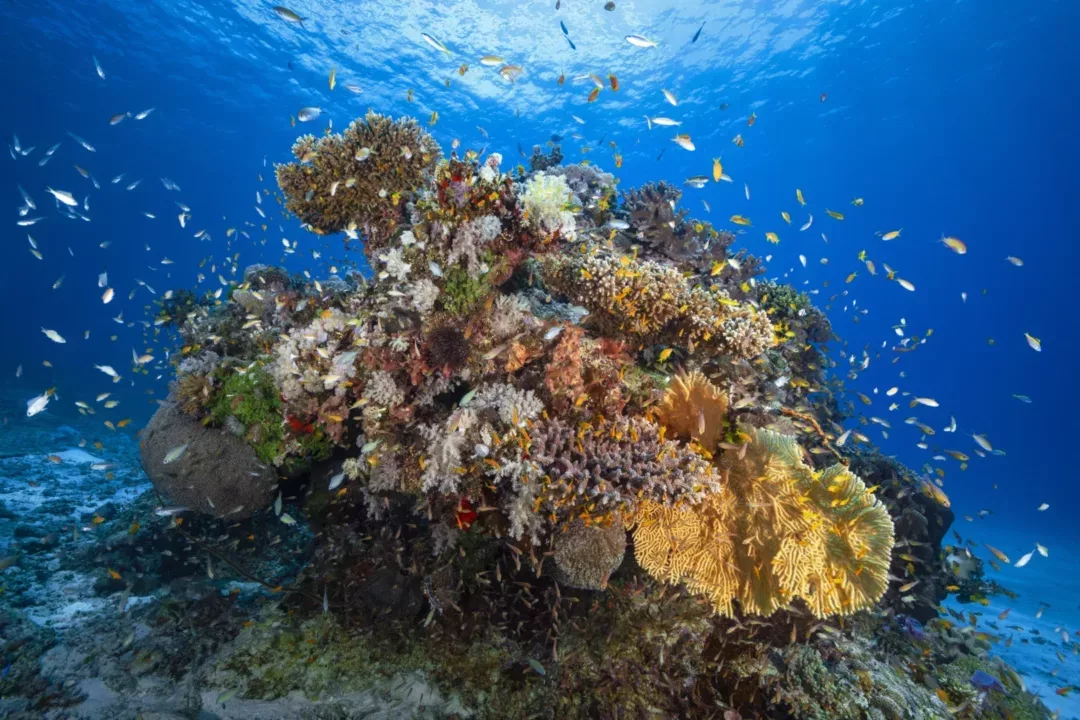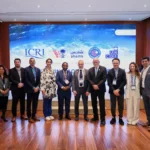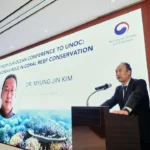The International Coral Reef Initiative (ICRI) was pleased to participate in the Tenth Our Ocean Conference (OOC), held in Busan, South Korea, 28 – 30 April 2025. The conference took place against the backdrop of the ongoing fourth global coral bleaching event – the most severe on record – affecting 84% of the world’s coral reefs impacting ecosystems across 82 countries, territories, and economies. The urgency to secure a future for coral reefs has never been greater.
To continue to raise the plight #ForCoral ICRI led and supported key events focused on accelerating coral reef conservation in the lead-up to the Third UN Ocean Conference (UNOC-3). The ICRI Secretariat, alongside the ICRI Chair – the Kingdom of Saudi Arabia, represented by the CEO of the General Organization for Conservation of Coral Reef and Sea Turtles in Red Sea (SHAMS) – actively engaged with global partners to advance bold, coordinated action for coral reef protection and share upcoming focus areas and opportunities for collaboration within the 2025 – 2027 ICRI Plan of Action.
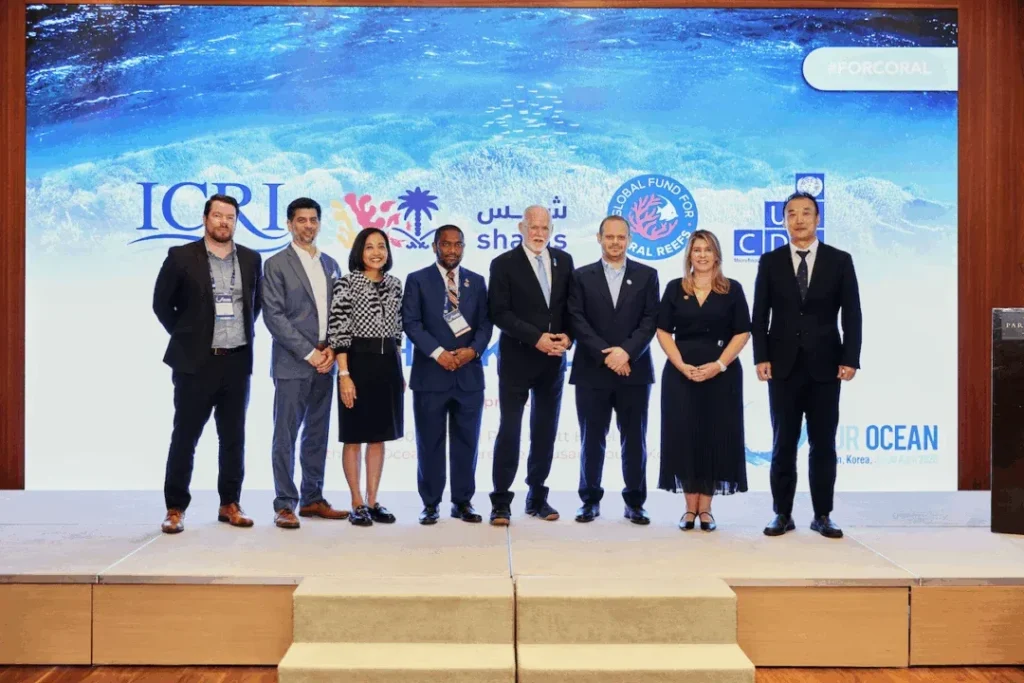
High-Level Breakfast: Accelerating Action #ForCoral
On April 30, ICRI and the Global Fund for Coral Reefs (GFCR) hosted a high-level breakfast event, “Accelerating Action #ForCoral”. The session brought together government leaders, policymakers, scientists, and donors to catalyse action and build momentum for coral reef protection globally. Opening the event, Dr. Amzath Ahmed, State Minister of Fisheries and Ocean for the Maldives, emphasised the urgency of collaboration: “We must unite in our efforts and act with accountability,” he stated. “It is imperative that we take collective action to confront these challenges – no single entity can address them alone.”
Dr. Khaled Asfahani, co-chair of ICRI and CEO of SHAMS, presented the ICRI 2025–2027 Plan of Action, outlining a strategic global roadmap to strengthen coral reef resilience and align conservation efforts with international targets, noting “we must turn commitment into measurable outcomes”. Joseph Appiott, representing the Secretariat of the Convention on Biological Diversity (CBD), highlighted the pivotal role of the Kunming-Montreal Global Biodiversity Framework in scaling up reef conservation. He emphasised that every target within the framework can – and should – be viewed as an ocean target, reinforcing the ocean’s central place in global biodiversity goals.
The GFCR, with remarks from Yabanex Batista, noted the importance of coral reefs, for biodiversity, people and economies, showing success stories from the field by Konservasi Indonesia, demonstrating community-led solutions and effective funding mechanisms’. Myung Jin Kim, from Korea’s Ministry of Oceans and Fisheries emphasised its national commitment to reef protection, while Ambassador Peter Thomson, UN Secretary General’s Special Envoy for the Ocean, concluded the event with a call to collective action, noting we are all in this together and that we can only have “hope if there is progress” and that we must unite to show tangible progress to ensure a future for coral reefs.
Side Event with CTI-CFF: Reefs at Risk, Food at Stake
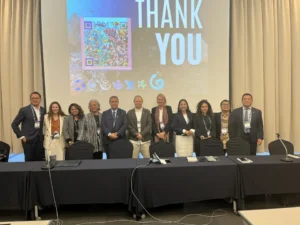 ICRI also co-hosted a dynamic side event with the Coral Triangle Initiative on Coral Reefs, Fisheries and Food Security (CTI-CFF), titled “Reefs at Risk, Food at Stake: Scaling Coral Reef Conservation.” The session explored the critical connections between coral reef health and food security, especially for communities across the Coral Triangle and other vulnerable regions. Discussions showcased how regional leadership and global policy alignment can accelerate progress on the Global Biodiversity Framework, SDG14, climate resilience, and coastal food systems.
ICRI also co-hosted a dynamic side event with the Coral Triangle Initiative on Coral Reefs, Fisheries and Food Security (CTI-CFF), titled “Reefs at Risk, Food at Stake: Scaling Coral Reef Conservation.” The session explored the critical connections between coral reef health and food security, especially for communities across the Coral Triangle and other vulnerable regions. Discussions showcased how regional leadership and global policy alignment can accelerate progress on the Global Biodiversity Framework, SDG14, climate resilience, and coastal food systems.
Strengthening Partnerships
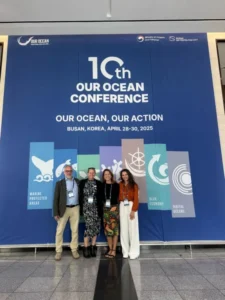 Throughout the conference, ICRI was pleased to connect in person with many of its valued members and partners, including Bloomberg, Blue Alliance Marine Protected Areas, Convention on Biological Diversity (CBD), Coordinating Body on the Seas of East Asia (COBSEA), Coral Triangle Center (CTC), The Coral Triangle Initiative on Coral Reefs, Fisheries, and Food Security (CTI-CFF), High Ambition Coalition for Nature and People (HAC), Interamerican Association for Environmental Defense (AIDA), International Union for Conservation of Nature (IUCN), The Nature Conservancy (TNC), Ocean Risk and Resilience Action Alliance (ORRAA), The Pacific Community (SPC), Wildlife Conservation Society (WCS), World Resources Institute (WRI), and Worldwide Fund for Nature (WWF), as well as country representatives such as Fiji, Kenya, Korea, Maldives, Palau, and Philippines. These meetings reinforced the importance of collaboration and shared advocacy in achieving global coral reef goals.
Throughout the conference, ICRI was pleased to connect in person with many of its valued members and partners, including Bloomberg, Blue Alliance Marine Protected Areas, Convention on Biological Diversity (CBD), Coordinating Body on the Seas of East Asia (COBSEA), Coral Triangle Center (CTC), The Coral Triangle Initiative on Coral Reefs, Fisheries, and Food Security (CTI-CFF), High Ambition Coalition for Nature and People (HAC), Interamerican Association for Environmental Defense (AIDA), International Union for Conservation of Nature (IUCN), The Nature Conservancy (TNC), Ocean Risk and Resilience Action Alliance (ORRAA), The Pacific Community (SPC), Wildlife Conservation Society (WCS), World Resources Institute (WRI), and Worldwide Fund for Nature (WWF), as well as country representatives such as Fiji, Kenya, Korea, Maldives, Palau, and Philippines. These meetings reinforced the importance of collaboration and shared advocacy in achieving global coral reef goals.
As momentum builds toward UNOC-3 in Nice, France this June, ICRI remains committed to uniting stakeholders behind impactful, science-based solutions to secure a thriving future for coral reefs and the communities that depend on them.
